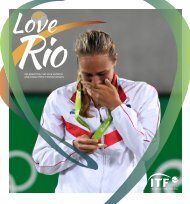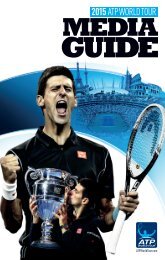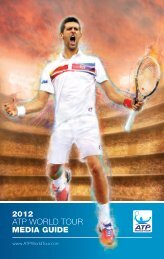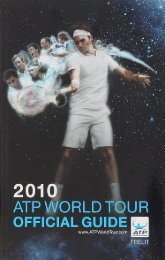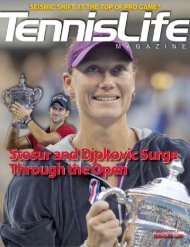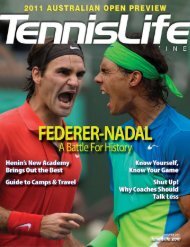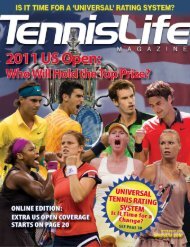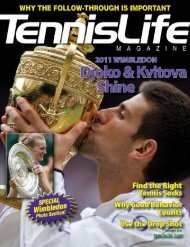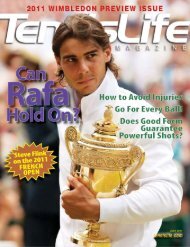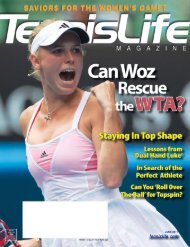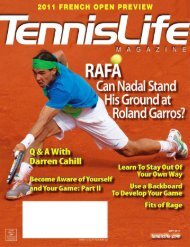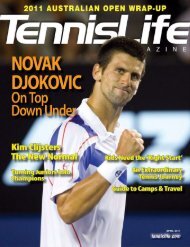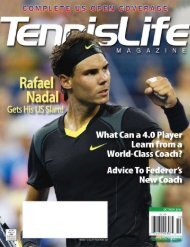A Champion's Mind - Pete Sampras
www.tennismoscow.me Insta:TENNISMOSCOW
www.tennismoscow.me Insta:TENNISMOSCOW
Create successful ePaper yourself
Turn your PDF publications into a flip-book with our unique Google optimized e-Paper software.
As I threw my arms in the air after winning what would be my last Grand Slam, I let out a primal simple<br />
scream that nobody seemingly heard or noticed. I hollered, “I f***ing did it!”<br />
The match had proven to be the final and most daunting hurdle of my career. I’d experienced two years<br />
of adversity with people breathing down my neck. And I’d found one last ticket to that place where I was<br />
completely focused and sufficiently confident to get the job done. When it was over, I felt great. The first<br />
person I looked to was my wife, Bridgette, up in the player guest box. I had to get up there; she’d been<br />
such a critical part of my final push. I wanted to share the moment with her, and I also wanted the world to<br />
see me doing it.<br />
I felt great. This was vindication, pure and simple. Weeks later, the late publisher of Tennis Week, Gene<br />
Scott, would write: “It just goes to show that at the end of the day, we didn’t know who <strong>Pete</strong> <strong>Sampras</strong><br />
was.” Gene later told me that he meant that as a reference to the depth of my competitive character. I was<br />
very proud when I read those words.<br />
I felt great. I had beaten my greatest rival on one of the biggest stages in tennis to win the title I would<br />
come to cherish most. As it turned out, Andre would have a little more fuel in his tank than I did, but he’d<br />
bought himself a few extra years by relaxing and taking a few breaks from the game in his prime. Andre<br />
would play deep into 2006, but my candle burned out quicker.<br />
After that last major final, Andre and I agreed to stay in contact—just in life. We agreed that it would<br />
be a shame, after all we’d been through together, to lose touch. Besides, we had a lot of things in common,<br />
including two kids each. We’d been players since the age of seven. We had a lot of history, a lot of life—a<br />
certain kind of life—in common.<br />
My sister Stella and her husband were at the 2002 Open, and they joined our small core group, along<br />
with my trainer, Brett “Moose” Stevens, in a small victory celebration back at our hotel. We ordered a big<br />
room-service meal and drank champagne, and I felt great. That same night, Bridgette and I flew back to<br />
Los Angeles.<br />
For the next two months, I woke up every day with a smile on my face. In just three months, I had gone<br />
from absolute misery—despite all that I had to feel great about—to absolute contentment. This was some<br />
example of closure, although I didn’t think of it that way at the time. In fact, in the following weeks, I idly<br />
wondered what was next for me. I never thought I was done as a player. I felt I was still in great shape. I<br />
had no doubts about contending. I didn’t feel like I was burned out. But as the weeks passed, I discovered<br />
I had no desire to play, and pulled out of all the fall tournaments on my schedule.<br />
By the time the Christmas holidays rolled around, I was getting used to hearing the happy squeals of our<br />
infant son Christian. Paul Annacone, who was still my coach, made sure I got out to hit a few balls every<br />
few days, but soon it was time to think seriously about getting in shape for the Australian Open. I realized<br />
I wasn’t motivated to do that, and I pulled out of that, too.<br />
I made no decision or announcement about my future; I wanted to be sure that when I was done, I was<br />
done for good with no second thoughts. Two weeks before the 2003 Wimbledon, Paul and I started to<br />
practice. I thought maybe I would play it again. But after a few days of hitting, I knew I was finished. I had<br />
no urge to compete at Wimbledon, or even to go and see the old place that had been so good to me. I had<br />
no fuel left in the tank, and it seemed like the work couldn’t be worth the potential reward. I knew it was<br />
time to call it a career.



